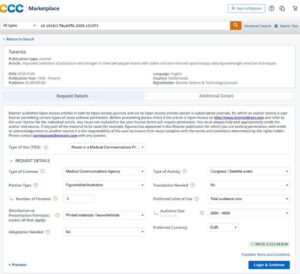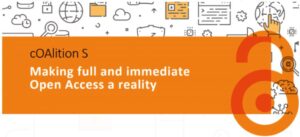We live in interesting times with significant challenges, the unpredictable geopolitical landscape, declining trust in science and the fast rise of AI are all impacting our research. The world of academic publishing is no exception. And we see now some worrying trends, with significant challenges for academic autonomy if we do not act quickly.
The issue
Several big publishers have started recommending authors to choose a CC-BY-NC-ND* license or are even changing their policy so that becomes the ‘new’ standard license in their workflows, instead of the CC-BY* license that consortia, libraries and funders request. This CC-BY-NC-ND license will prevent derivatives and commercial re-use, which might sound interesting to a concerned author that wants more control in how their research is being re-used. To introduce their change in policy several publishers reached out to their authors to present them with examples of how the current CC-BY license could result in their work being used for the training of generative AI or their images being re-used in a commercial folder from Big Pharma and followed up by inquiring about their concerns and needs. It will come as no surprise that many researches asked for more control or a form of protection. Publishers responded by announcing that they were listening to the needs of their authors and that their new policy includes a standard CC-BY-ND-NC license, which they actively recommend authors to use or is the standard option.

It all sounds very reassuring, until you dig a little deeper and start asking the critical questions.
The problem
If you, as a researcher, wish to make use of this standard CC BY-ND-NC license, you will be asked to sign a standard agreement or license to publish (LTP). This agreement describes who is the owner of the publication and who can manage the publication. You are transferring part of your rights, the exclusive rights to manage, to the publisher, after all, they argue, they have to be able to publish your research and protect you from the commercial re-use. This is where the problem arises. Once the publisher has your rights, they are allowed to make decisions on who is granted dispensation for use that conflicts with your license, like commercial re-use of your work. I specifically asked one of these publishers during their presentation if the author would be involved in this choice, but that is unsurprisingly not the case. They claimed involving the author would be too burdensome.
This means we now have a situation where the publisher holds your rights and can decide to grant commercial re-use without your input. In fact we already see this happening. The Copyright Clearance Centre Marketplace (CCC Marketplace) is frequently used for this purpose and quite conveniently, now also offers the option to buy in bulk. The example below shows the ability to pay access to an entire journal since 1999

Third parties simply specify the type of use they want and CCC Marketplace will come up with a price or connect them to the publisher. There is a lot of money involved, below is an authentic example of an article being sold for re-use at €5015,98 the original article was published with a CC-BY-NC-ND licence

The proceeds from such a sale go to whoever holds the exclusive managing rights, in this case that means the publisher. The original author will receive noting, having relinquished their rights to the publisher under the guise of protection from commercial re-use.
Another concerning aspect to all this that publishers can also decide who not to sell to. If they choose they can make sure that competitors, for example, open alternatives to commercial AI tools, have less chance to succeed. They can simply set a price for dispensation that an open, community driven, non-commercial initiative will never be able to pay.
After informal questions put to publishers on this topic and the mechanisms, it was established that we, as universities could continue to use the CC-BY license as an exception, they framed it as libraries not wanting to protect their authors though. We wonder how long until that exception will hold and at what financial costs. From the library perspective, we are also worried that the publisher will continue to push authors to use the CC BY-NC-ND license without communicating clearly what the consequences are.
Our stance
As libraries we are here to support and advice researchers that want to publish. We understand why they would want more control on who gets to re-use their work for commercial purposes. It will require a license that allows the author to retain their rights and stay in control of whom they want to grant the right to re-use (or not) and as libraries we will absolutely strive to make that possible, but it is not simply up to us alone.
Academic sovereignty is under attack, it has been for a long time and it seems we now have a new battle to fight.
If you have ideas, feedback or other comments I’d very much like to hear them. You can leave a comment or e-mail me directly.
Additional information
*Read about the different licenses here and here

